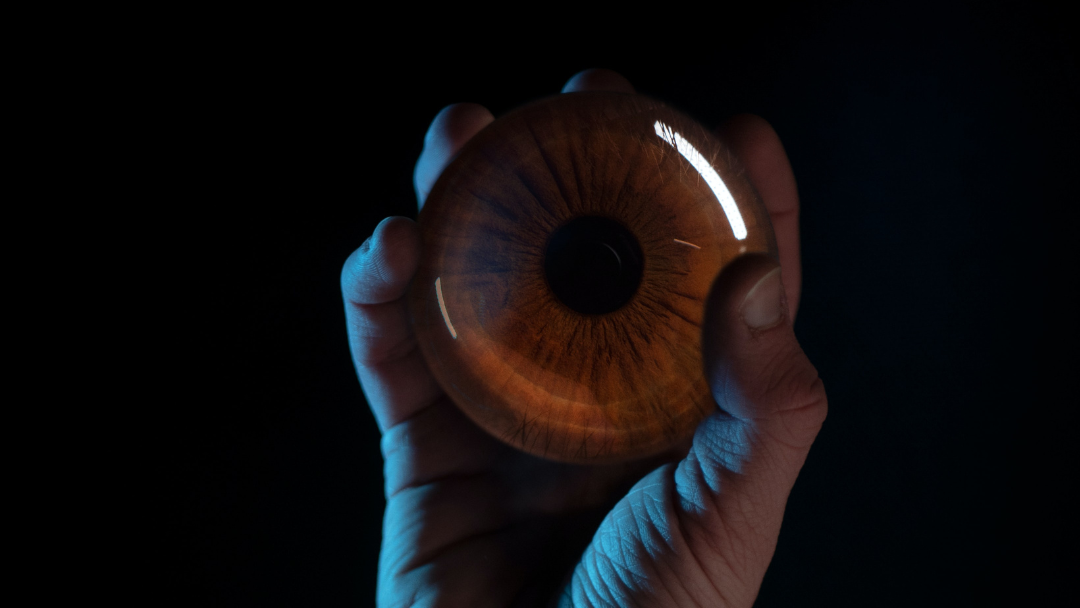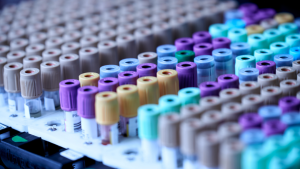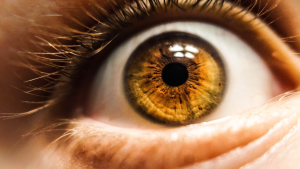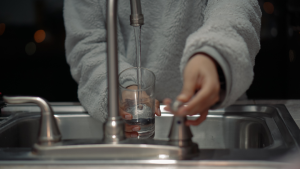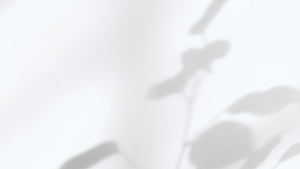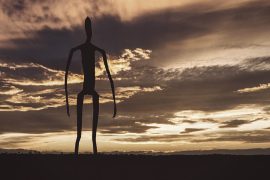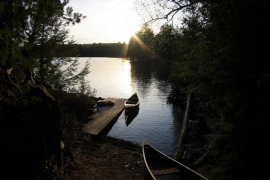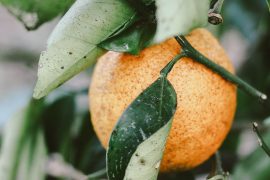Winner of the Bridge Eight Summer Short Story Prize
Estimates suggest Nellie Plink started sheening sometime in late December.
Her husband of two years first noticed the characteristic iridescent film glistening in a strobe of fireworks. With cloud cover blanketing the Northern cove of the island, the manifestation may have gone unnoticed for several days. On average, ocular transformation reaches completion within one week, but the duration of initial sheening with its slight presentation is largely unknown. On New Year’s Eve, Dan Plink had turned to kiss his pregnant wife under the grand finale and realized, after a moment, that the mini oil slicks swirling over the surface of her eyes were not mere reflections. Twenty-four-year-old Nellie maintained the ocular sheen for three days before her indigo irises flushed a honey gold along with the whites of her eyes, two pots of translucent amber housing black jellyfish pupils pulsing toward the surface.
Volatile organic compound (VOC)-induced metallization (VIM) refers to a series of ocular mutations that result from exposure to high doses of VOCs. In disease stages III and IV, “meli makas” (honey eyes, as islanders called them) typically exhibit a symmetrical widening of the eye sockets, followed by dramatic solidification and vertical compression of the eyes into flat, circular disks of raw gold ore, similar in size and shape to a U.S. silver dollar. Dan Plink had driven his wife to Pohala Memorial Hospital, doctors flooding the lobby when word spread of the unprecedented condition. As a nurse escorted Nellie to her room, a second case arrived, seven-year-old Kapo Mahi’ai. His brown eyes had dissolved to “wai lemi”—to lemonade—as he was having breakfast, his mother told the receptionist. At the time of admission, both Kapo and Nellie were Stage II VIM: translucent gold eyes, no discernable iris, and no adverse effect on vision. The hospital flew in Ophthalmic Surgeon Dr. Wes Santana to assist, who wrote in the Plink file: unstudied, undocumented, patient zero. “It is the unknown that excites the ardor of scholars,” he had quipped to a colleague over the phone.
On the day after the two hospital admissions, John and Pua Orlay lost their daughter. The scenic viewing platform in Kualono Park had collapsed, dropping twelve-year-old Anna one hundred and twenty feet to the rocks below. John and his wife had felt it wobble and leapt off. Anna had not. The ambulance had arrived at Pohula Memorial within forty-five minutes of the accident, paramedics rushing Anna to critical care with John and Pua at their heels. ER residents, preoccupied with the novelty cases upstairs, took four minutes to respond to the code blue. Doctors were busy examining Nellie Plink’s husband and Kapo’s mother Rubi for ocular aberrations, detecting none. The eye exams were followed by questions on foods they had eaten, places they’d visited, cleaning products they used, and then some tossing back and forth of hypotheses, diseased taro root, bean goose mites, poor hygiene practices, high stress environments. John and his wife had overheard whispers of gold-eyed patients as ER doctors attached wires and tubes to Anna’s body. They were soon ushered to a waiting room.
Anna Orlay’s official time of death was 3:32 p.m. A doctor had informed the family that just two percent of patients who fall distances of over one hundred feet live long enough to receive a hospital discharge, ballpark figure. Anna had been holding the rail of the viewing platform on the way down, potentially increasing her impact velocity. Had she free fallen, air resistance may have slowed the acceleration of her ninety-five-pound body. Instead, she had hit the canyon floor at an estimated sixty-one miles per hour, fracturing her thoracic spine and transecting the aorta. “Aside from the three seconds spent falling, you’ll be happy to know she didn’t feel a thing,” the doctor said. Pua had tensed her fingers around John’s, seething from the comment, but nodded placidly. She replayed the event in her mind, seeing her daughter’s long jacket, the leg of her sweatpants, the loose bits she should have grabbed.
John pulled his wife closer. The doctor scribbled on his clipboard and backed the door open, holding it there to signal the meeting was over. In the lobby, John signed paperwork while Pua stared vacantly at a magazine headline: Carriers Fill Up at Sea After 12,000-Gallon Island Jet Fuel Tank Rupture. The morgue would handle things from there. An open casket viewing may be possible with some mortuary wax and a good sculptor. Pua had told John she loved him, tapped his chin with her finger. John would recall how the gesture made him smile, how his wife had stopped the world from spinning for one window of time. Pua wouldn’t recall any part of that day, except the moment she had pointed out the redwood viewing platform on the path through the trees.
They delivered the news to Anna’s seventeen-year-old sister Olive upon arriving home. Olive had traded the family outing for sleep that afternoon. John pressed his daughter’s head to his chest, the scent of plumeria shampoo projecting images of Anna across his eyelids. The three clung together in the darkened entryway as if teetering on a cliff edge, unable to speak, unwilling to let go. Olive broke first, pulling her parents into the light of the living room.
Doctors had drawn blood from Kapo’s antecubital vein and sent it to the lab for white cell counts, liver enzymes, lipid profiles, and the like. A miniature scientist himself, according to his mother, Kapo’s curiosity eclipsed all anxiety over needles and gloves and prodding. Doctors noted his fascination with the stethoscope. He remained cheerful and compliant when allowed to listen to the nurse’s heartbeat. In request for prayer, Rubi had sent a photograph of Kapo’s gilded eyes to friends, generating talk among islanders of angry gods retaliating for breaching the “kuleana”—the reciprocal relationship and responsibility to the land. Within four days, the hospital had admitted seven new cases. Media coverage kindled widespread debates over toxic water taps, vengeful gods, and government loyalty. Rubi’s photo of Kapo made the front page of the Times. She refused to participate in press interviews.
Nellie Plink, an island florist entering her second trimester of pregnancy, was reportedly amenable to the press, offering animated accounts of her experience as her thinning eyelids got caught up behind her inflated eyes like a shirt sleeve entangled in a rotating lathe. She had joked that Pohala Memorial should sell tickets to view the oddity, her misshapen eyes now resembling cartoonish Little Orphan Annie saucers. Her left eye solidified faster than her right. Tapping a steel probe on the cornea made a high-pitched clink. Dan had been lounging in Nellie’s hospital room watching the news when governor Mahi’ai released a statement: there is insufficient evidence to suggest an association between the fuel leak and the rising cases of ocular transformation. Tap water is safe to drink.
Representatives of the fuel storage facility first reported the tank failure on Thanksgiving, thirty-eight days before the hospital admissions of Mrs. Plink and Kapo Mahi’ai. The earliest record of resulting wildlife aberrations came from a seismologist measuring volcanic activity in the two-acre spill zone. Brushing blades of guinea grass aside to examine what she had assumed was a “hammered brass bowl,” the seismologist flinched at the rising head of a tortoise, shifting the weight of its gleaming metal shell. Within two weeks of admittance, hospital doctors had concluded that Mrs. Plink, Kapo, and the other patients would not make full recoveries. The condition progressed rapidly, their vision fading to complete and irreversible blindness within fourteen days of sheening. A healthy pregnant woman’s ultrasound revealed metal formation in the fetal orbital sockets. For study, doctors removed the eyes of an eighty-six-year-old patient who died of cancer while in Stage III VIM. Metallurgists determined the hardened surface of the eyes to be 91.4% gold ore, 8.6% collagen fibrils.
Three weeks into her hospital stay, Mrs. Plink’s right eye, now a solid gold disk, had fallen freely from her eye socket, rolling along the linoleum and spinning to a stop. Dr. Santana noted the shedding of the right eye, the clear orange substance forming in the now vacant orbital socket, and the looseness of the left eye disk. Mrs. Plink had entered Stage IV, the most advanced case observed to date. A nurse applied a patch as Nellie delivered obligatory pirate jokes, aiming her speech at his touch, at the eddy of air mingled with tobacco and latex. Each night, Dan slept next to her in a fold-away cot, doing what he could to preserve their routine, saying goodnight to her growing belly so his unborn son would learn his voice. Doctors found no fetal abnormalities. Still, concerns blistered Nellie’s thoughts, pinching her from sleep. The hospital admitted twelve more sheening cases, two from their own staff. Epidemiologists ruled out contagion. Despite continuous travel in and out of the island, including a Stage III patient who left the island to be with family, no cases emerged outside of island shores. A man in Brazil developed symptoms but had vacationed on the island over the holidays. Media coverage of failed attempts at treatment fueled public appeal for action. Consulting scientists for the fuel storage facility ordered studies on vertical migration patterns of jet fuel in soil. In a press conference, Governor Mahi’ai reiterated that ongoing sampling indicates no contamination of the water reservoir, disguising his doubts with lifted chin.
In less than forty-eight hours, Kapo Mahi’ai’s amplified disease state had surpassed that of Mrs. Plink. He had shed both eyes, solid metallic disks. Two new ones had formed and solidified in their place. Governor Mahi’ai considered transporting his grandson to a private location; Kapo’s hospital room windows vibrating with parking lot protestors trumpeting industrial negligence and divine retribution. Afraid of the dark, Kapo’s vision loss had thrust him into a nightmare, oscillating between fearful sobs and vacant silence. Rubi was alone with Kapo that afternoon, reading aloud and rocking her son, when she heard a shrill chirping. Having first assumed a window-perched warbler or pipit, she realized the sound had come from her child. She spoke his name, her vocal cords breaking the syllables into static.
Rubi would tell doctors of a sudden rigidity, like candle wax firming as it leaves the flame. She had cried out for a nurse, clasping Kapo to her chest and swaddling them both in bed sheets—she would later explain—to thaw his frozen body. Pried from her child by white sleeves, Rubi blinked in the confusion, held her eyes on her son’s small foot, his gray sock, as she was swept from the room.
#
John Orlay had risen early for work that day. He took shelter in routine, returning to work just days after Anna’s funeral, barricading himself in the curriculum. The Orlay’s lived about ten minutes from Waimea Middle School where John taught seventh grade English. Anna would have joined his class that year. They’d considered relocating to the mainland two years ago, but Pua wanted the girls to remain on the island near family, at least until Anna graduated high school. John had returned from the holiday break to heated division among his colleagues, puzzled to find two otherwise compliant, easy-going coworkers lugging bins of bottled water up the front steps each morning despite clear assurance of water safety from the Board of Education and Water Resource Management Commission. John had taken to eating lunch in the car, dodging teachers’ lounge feuds over staff faith in Board directives. The evening of Kapo Mahi’ai’s death, he’d heard the creak of Olive’s bedroom door. His daughter flopped onto the sofa next to him, head in her iPad.
“He’s gone. The Mahi’ai boy.” Olive had read the specifics to her father, the condition having spread from the ocular nerve down the brainstem to the spinal cord, resulting in sudden muscle rigidity and asphyxia.
John made no comment, eyes tracking the text on the television screen, an assembly line of letters revealed one by one, . . . ruptured fuel tank located 150 feet above island water reservoir. . . contamination unlikely. . .
“One hundred and fifty feet above,” Olive offered, noting John’s focus. She showed him her iPad, a map of the island. On the beach to the left of the map was a little cartoon building labeled ‘Water Desalination Plant.’ Thin lines connected it to the box in the map’s center marked ‘Underground Water Reservoir,’ and hundreds of lines webbed out from there, leading to hundreds of tiny cartoon houses. “The fuel leak was here,” she said, pointing to the center. “Right above our water supply.”
It had seemed to John that Olive would come through the loss of her sister okay. She had continued going out with friends, and while she kept to her room when at home, she still joined John and Pua at mealtime. She used the guest bathroom now, refusing to enter the Jack and Jill bathroom she and Anna had shared since childhood. Aside from her sun-sprayed hair and freckled cheeks, John saw nothing of Anna in Olive. He often marveled at how two kids raised in the same environment could turn out so different, Anna a sensitive creative like her parents, Olive an athletic, social butterfly, yet now his heart dropped with the thought.
Pua had prepared a tray of cheeses and table water crackers. “Anything to drink?” A mechanical grin spread across her face, bizarre against her listless eyes. John, having been intrigued by her attempt at normalcy, requested an iced tea. Olive rose from the sofa and disappeared into her room. Pua suggested they take some time to travel, New York or California, once Anna’s accident compensation came in. Her indifference wrenched at his sternum. He shuffled past Anna’s closed bedroom door and knocked softly on Olive’s. No answer. John feigned sleep as Pua crawled under the covers. They both pretended, huddled against each other.
Over the next week, VIM patient admissions brought the island hospital to capacity. Long-standing businesses and farmsteads shuttered, much of the labor force irreversibly blind. Governor Mahi’ai announced proposals for financial assistance: those who’d lost immediate family would be eligible for funds. The announcement sparked fury at the exclusion of the sick, most of whom were already, or would soon be, unable to maintain gainful employment. Spiritual groups assembled at heiau to pray for forgiveness, outside religions calling the practice blasphemous, their loving god incapable of inflicting infirmity and death. Grocery shelves emptied of bottled water, shipments taking days. Eyesight fading, sheening patients picketed outside the Board of Water Supply, demanding protection, chanting things like ‘ protect our families’ and ‘people over profits.’ To assuage the public, the Department of Health ordered third-party testing of the water storage reservoir, the inspection scheduled for three months out. The most promising option came from French real estate mogul Niels Madan. A reclusive European billionaire with a reputation akin to that of the Collyer brothers, Madan had recently left his French mansion refuge for six months at sea with his wife. A week after Kapo Mahi’ai’s funeral, Madan resurfaced outside the Island Council Chambers. A solution to the circumstances plaguing the community, he stated, would continue to stagnate in the fixed procedures and hierarchical authorities of government and industry. Current legislation provides little incentive to expedite remediation. His voice broke, a long silence, before adding he and his wife had visited the island in December.
Madan criticized the stalled government efforts, placing blame on stakeholders and limited government funds. In conclusion, he announced the handing over of the Tour Première, his highest valued asset, to be modified into luxury housing for all islanders, healthy and sick. The grand tower, he explained, would be outfitted with blind independence training centers, the world’s most advanced assistive technology, and on-site medical facilities offering specialized care. Rising thirty-eight stories, the tower would be equipped to house up to one thousand five hundred patients and their families over a period of five years. Madan vowed to donate an additional €1.5 billion toward treatment research. Attendees rolled their eyes at the announcement; however island residents began receiving invitations within one month, boasting full relocation expenses. Hundreds flocked to The Centre de Guérison, news outlets remaining neutral to appease French division over potential contagion. In the end, no Centre staff would develop symptoms and no new cases originated from outside the island.
#
Dan Plink had missed a 2:00 p.m. call from Dr. Santana, who left a dry voice message to come as soon as possible. He arrived at the hospital within forty minutes of the message. He’d tried to convince Nellie to consider the France move. No matter what the media relayed, neither of them believed the water was safe, too cynical to stray from vigilance. Dan had laid out the pros and cons, the pros both financial and personal. Paid medical expenses, room and board, they could sit on the terraces of Parisian cafés and eavesdrop on the city, walk the spring gardens, raise their son. She would be free to live comfortably. She could learn assistive technology, regain her independence. But Nellie would not leave the sweet honeysuckle and sea mist. The smells were more beautiful here. Paris was void of beauty without sight. A nurse pointed him to the intensive care unit, the empty halls evidencing just how many patients had abandoned the island for Europe.
He studied his wife’s porcelain face, her muskrat nose and heart-point chin; he remembered she had hoped the baby had her facial features, but his eyes. Nellie told him the baby was gone. He squeezed her hand. He said he knew. Nellie said she had known for over a month they would lose him, ever since the Mahi’ai boy. Dan burrowed his head in her breast and closed his eyes, melting into the warm, dark space. Straining to speak, Nellie told him not to leave her. It was then that he sensed her ribcage rounding outward, stiffening, as if she’d swallowed a wine cask. He stood to signal the nurse.
He felt the heat drain from her hand, her fingers turn to stone, lifting from his as the monitors screamed in beeps and flashes. The nurse, unable to flush the lines, ran for help.
“Don’t be afraid.”
A slice of sun filtered through the blinds, crowning her dollish brow in radiant grace. Medics rushed her bed, pushing Dan aside as they clambered to attach electrodes to her now exposed chest.
“I’m here.”
Commotion settled to calm, doctors backing from the bedside. Dan traced the gentle tilt of her lips. For a moment, he drifted in circling white, interlaced in the current, then, anchored to breath, sunk into the harsh angles of the room. Dr. Santana had closed the blinds and helped Dan to the hall.
John Orlay, grading papers at the coffee table, had jumped when the ceramic mug shattered on the kitchen tile, Olive covering her ears, jaw gaping. Their alarm turned to laughter at her having overshot the counter edge. John offered to take her for coffee, the place on the beach with outdoor seating, his daughter’s favorite, the shimmering gold flecks in her eyes enlightening him, as if he were meeting some new and inspiring being.
Olive had taken note of the vacant tables, blue beach umbrellas protecting nothing but sand. According to last count, nearly eight hundred islanders had fled to France.
“We use tap water, but it’s filtered,” the barista had told Olive, who passed up her espresso for a cup of steamed milk. John stabbed at the ice in his cold brew and tracked a sloop on the horizon as Olive explained how just being near the faucets made people sick, inhaling the vapors. She told him her school friends had already left with their parents and grandparents—families who’d lived on the island for generations.
She whispered, “Suppose they can fix me?” as if speaking the words aloud was taboo.
Garnering no response, she tipped her head to meet her father’s downcast eyes.
“I’m going. You and mom can stay here if you want.” Olive’s hands trembled as she lifted her cup. Her father fought to hold in the thoughts he knew would upset her.
“How can you risk your own family’s life?” Olive wiped her dappled red nose with a scalloped paper napkin. “You’ve already lost one.”
Patience frayed; her father had leaned forward; arms folded across the undersized tabletop. “Don’t you watch the news? I can’t understand how a daughter of mine can fall for foolish, unfounded rumors.” He released the air from his lungs. “It’s not the water, Olive.”
For the first time, Olive had appeared to him as a woman, remnants of the little girl patched into her skin. Soon she would discover his mortality, his likeness to any aging stranger on the sidewalk. It is what he missed most about Anna, her awe and unwavering trust in him, the infallible knight. He recalled the evening before her death, when a friend’s mom arrived to pick her up and drop them at a shopping center. Upon learning the kids would have no adult escort, he had forbidden her from going. She hurled her backpack to the ground, stomping and slamming her bedroom door. A half hour later, they were giggling over a game of Uno, Anna apologizing on her own accord, saying it was fine, he was protecting her.
“We could at least go see the place,” Olive ventured, shoulders stooped in defeat.
By the time they’d reached the car, Olive had yielded, stretching to kiss her father’s forehead, her warm honey eyes like clear round suns.
#
Dan Plink’s golden eyes had begun to solidify just one week after losing his wife. Dr. Santana had seen plenty of disturbing things in his career, but distended eyes dropping gold coins to reveal molasses-laden sockets had repulsed him. He’d considered leaving his post at the hospital, going back to his family on the mainland, to grocers’ pyramids of Evian and Fiji, drinking and showering and cooking without fear. He shook the thought, unsure of where it came from. His role was vital. To question the numbers was sacrilege. He picked up his phone to call his wife, replaying Dan’s peaceful retreat from Nellie’s bedside, the serene smile that colored his face as they parted.
Where the waitlist for the Centre had extended into the hundreds, it now had as many openings. Stage IV patients refused attempts at resuscitation after watching friends and family kept alive by machines for months. More than half the island residents were now permanently blind, paralyzed, or waiting in the morgue to be transferred to centuries-old family plots. Blindness left the island silent, devoid of traffic, music, birds. No tourists, empty beaches, boarded windows. Those who had chosen to stay had lost what they’d stayed for. The billion and a half Madan had invested in a cure had yet to provide solutions. Studies on VOC-induced metallization of biological tissue were lacking. In June, advocacy groups had pushed for mandatory evacuation. Governor Mah’ai resisted, having only the island after losing his daughter Rubi two weeks earlier, his grandson long buried. Rubi’s accelerated progression had been unprecedented, shedding both eyes and becoming paralyzed within days of sheening. He could recommend eviction but would not leave himself. He passed away in his home less than one month later.
Olive now slept on the sofa; her vision too faint to navigate the hallways. Pua had often stayed up late, refilling tea and offering to read and respond to Olive’s texts from friends, those still alive in Europe. John would order delivery, Chinese, sometimes Moroccan. On good days, Olive would ask him to describe the layout of the tray, the kefta on the top right, grape leaves lower left. On bad days, the two would co-exist in silence. He would tousle her hair, then retreat to the bedroom, often pausing in the hallway, absorbing the time they had left.
Cases had dropped drastically over the summer. The island hospital admitted only four VIM patients in June. The Centre de Guérison had released much of its medical staff, requiring resources for just fifteen percent capacity. Gold-eyed occupants had passed away, no new cases anticipated aside from the few, more tolerant individuals remaining. Investments in research for a cure ceased. John chose not to share this news with Olive. It horrified him—the possibility that he’d placed unwavering trust in entities willing to decimate his family, his community, his land. He knew it was not impossible, but out of fear, or perhaps pride, he’d chosen to close his eyes. Olive had opened them. Maybe they had reached the impasse, the one his father told him about, where child and parent exchange roles. He liked to think so.
On August 10, health officials confirmed contamination of the island water reservoir with jet propulsion fuel at two hundred and fifty times over the level deemed safe for human consumption. The Department of Health recommended residents and pets avoid using tap water for drinking, bathing, cooking, laundry, dishwashing, and oral hygiene. Officials ordered immediate closure of the fuel storage facility and offered to relocate those remaining on the island to a safe location.
Three days later, the Department of Health posted an apology for having declared the island’s sole water supply as safe to drink, stating they mistakenly interpreted initial tests as negative for contamination, they trusted those initial tests, they regret informing island residents the water was safe, and they were deeply remorseful, concluding with—Our apologies to you all.
John printed out the statement to share with Olive. He needed his daughter to know that he learned from her, that she amazed him.
“Did you hear?” he said, “It was a mistake. You were…”
“Dad?”
He closed the sliding glass door to the lanai, the approaching summer storm whipping the sheer white curtains like celebratory ghosts. Pua had made her way into the kitchen, scrunching her hair in a neon beach towel.
“It’s white.” At first John thought it was Pua who spoke, not recognizing the sunken, faltering tone. “Everywhere. It’s white.”
“What do we want for breakfast?” Pua sang from the open refrigerator door. “Pancakes? Let’s do pancakes.”
John had gazed down at Olive, her patch-dressed head nested in the pillowcase Pua had embroidered days before her birth. He pulled Pua from the kitchen, held his eyes to hers, mahogany fireflies. He thought she looked so much like Anna. Didn’t she? He wasn’t sure anymore.
“She’s leaving us.” Pua whispered with a soft smile, tilting her forehead to his chin.
John clenched his fists, nails digging ruts in his palms, trying to remember. If we could just go back.
RYLANN WATTS is an editor and previously unpublished fiction writer based in Portland, Oregon. She received her master’s degree from the University of Oklahoma and is currently at work on her first short fiction collection.
Like what you’re reading?
Get new stories or poetry sent to your inbox. Drop your email below to start >>>
OR grab a print issue
Stories, poems and essays in a beautifully designed magazine you can hold in your hands.
GO TO ISSUESNEW book release
Ghosts Caught on Film by Barrett Bowlin. Order the book of which Dan Chaon calls “is a thrilling first collection that marks a beginning for a major talent.”
GET THE BOOK
